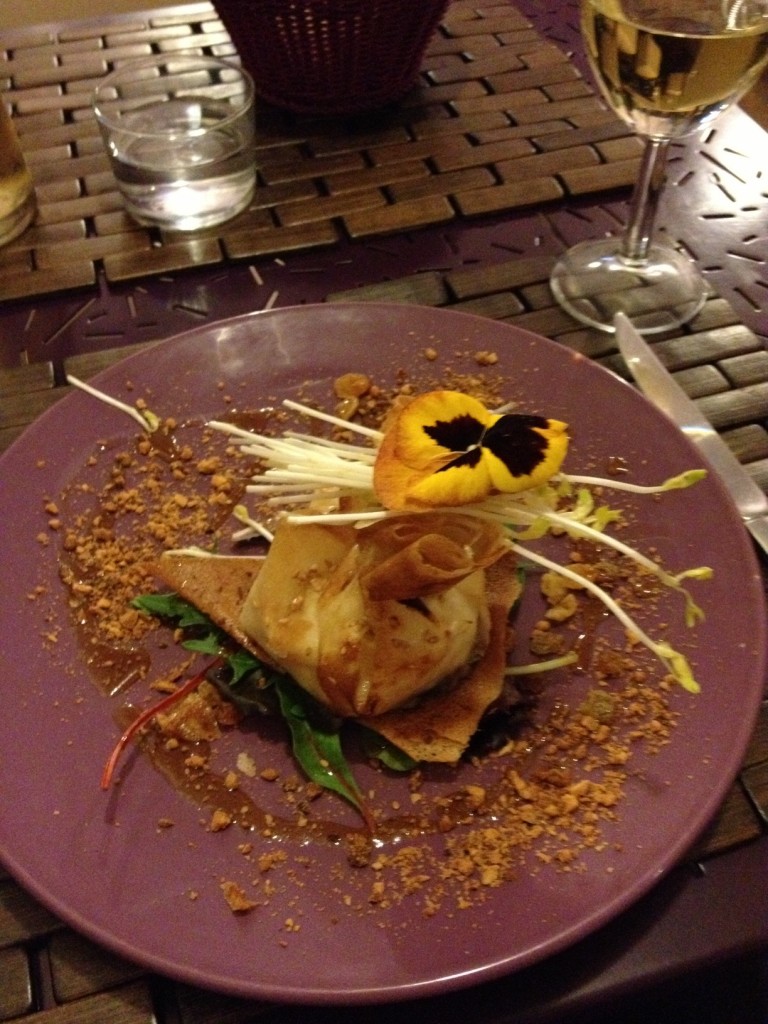
One of the exchange agreements that we have is with the Université Paul Sabatier in Toulouse. This year we don’t have any students visiting “la ville rose” but last year we had two. Toulouse has a very high student population and so it’s quite lively. When I visited our students last March, I was impressed by the beautiful city centre and I had a really good dinner at a restaurant near the train station, as you can see from the picture. The University is quite like Imperial as a campus (i.e. modern and functional) and the research projects that our students worked on were topical and interesting. Both supervisors said that they were happy to take another student from Imperial, so job done there!
When students return from placement, they are asked to fill out a debriefing form. Here’s a really good one about Toulouse:
Local Information: Term 1 from mid-September to mid-December, Mid term exams the first week in November and Main Exams in January. There are many public holidays in April/May. NOTHING or very little shops open on Sundays.
Travel: Really good Transport system, 10€per month for bus and metro with Carte Pastel. With the Carte Pastel you can pay 25€ for the year to use the Velo de Toulouse.
Useful paperwork to take with you: Copy of birth certificate, passport/visas, European Health Insurance Card (EHIC). A form from the university saying you are insured to work in labs in France (unpaid). I think its called a convention in French if I can remember correctly but some labs will demand it.
Local bureaucracy, language issues: Bureaucracy in France is ridiculous. There is a mountain of paperwork and you will find yourself going back and forth getting the right piece of paper.
Financial matters: Much cheaper to live then London!! For opening a bank account I think you need your passport, EHIC, your paul sab student card and possibly proof of address (attestation de residence) in France. The rent was cheap particularly after le CAF (government body that can give money towards rent for students, something like 40% off).
Social Activities: There are so many things organised for the Erasmus by the university. Also amongst the Erasmus we organised a lot of cultural evenings like international food night. There are plenty of clubs and sport you can get involved in. I did Horse riding and went skiing in the Pyrenees some weekends with the university.
Food, pubs clubs, bars: The food in France is fantastic. Delicacies in Toulouse are the duck, casserole and the local wine. Toulouse is has a high population of students so there are many cool bars and things to do and see.
Accommodation: 9m2 ensuite renovated room with its own kitchenette. I found the room great though I know some people complained about the size being too small. The bed was electronic (you push a button to bring it up or down depending on whether you want to sleep or do work underneath. Unfortunately my bed broke after an electricity break down in the room and never got fixed. The woman in the reception of the residence was very unhelpful and unfriendly and does not try and slow down her rapid French so good luck to anyone trying to understand her at the start.
Local places worth a visit: La Garonne is beautiful and we spent a lot of evenings in the warm weather sitting on its banks. The city centre based around Jean Jaures and Capitole is beautiful to walk around. There are many beautiful churches and museums. I would definitely suggest visiting Carcasonne to see the great medieval castle.
Where to go for help: Fabrice Dumas the Erasmus coordinator at paul sab is extremely helpful when it comes to academic things. Otherwise I would go to Erasmus office in la forum building. Problems with your accommodation can be sorted in the reception of your building but it was often more useful to go to the reception in tripode A.
Health matters: There was a walk in doctor’s surgery on the route de Narbonne.
Comments on any courses taken: I took some lectures of License 2 biochemistry. It was a much lower level than I expected and suggest for students picking courses to do L3 modules or even M1.
Comments on project/lab: I was very fortunate to have my lab placement organised by Fabrice in a research topic I was really interested in and with a great supervisor. She took a lot of time explaining scientific concepts and fundamental approaches to molecular biology research.
Preparing your report write-ups: For my cultural report I researched on the internet the history of the Erasmus programme, used a questionnaire to gain first hand experiences of other Erasmus students as well using my own experience. From the start of my lab placement I read some papers around the research topic particularly the review recently published by the group. The outline report helped to start to think about what I was really doing in the lab and how it fitted in to the bigger picture of the project.
Comments on College Project Tutor visit: I found this visit really helpful. It was nice to see a friendly face from Imperial as sometimes through the year abroad you can feel very disconnected from the university. The feedback we received in person was particularly beneficial.
Any other suggestions or comments: For anyone starting a year abroad I’d say “don’t be afraid to speak!”. I made the mistake at the start as I assumed my French was a lower standard than everyone else so I ended up being quieter than I normally am therefore my French level didn’t improve a lot in the first term.